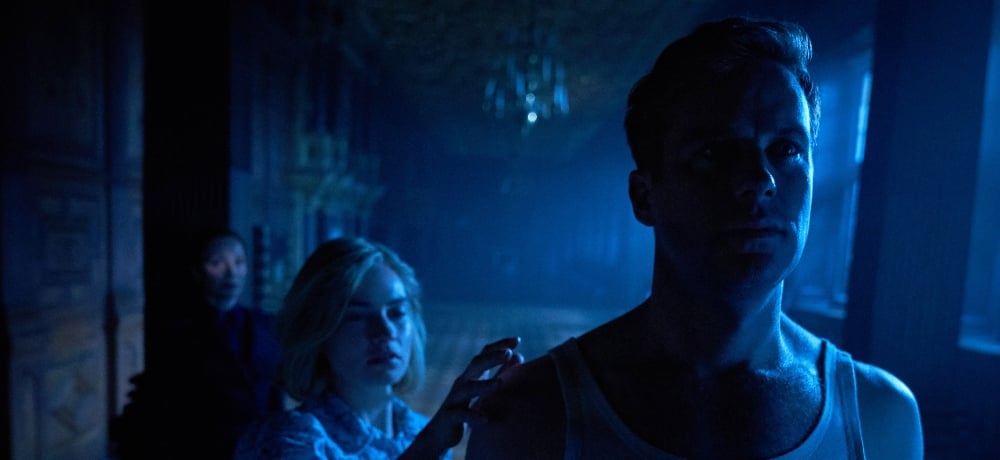






The final word in all that is haunting Gothic goodness is simply… Rebecca. In the tradition of Cher, Whitney, and Dolly, Rebecca is an icon that only needs one name and she has cast a shadow over culture since Dame Daphne du Maurier’s 1938 novel first introduced her to the world. For years the defining image of Rebecca has been the Academy Award-winning 1940 film by the Alfred Hitchcock and starring the Laurence Olivier, so it was exciting to see Netflix scoop up the story and give it a younger, fresher face!
In Rebecca, a young and nameless lady’s companion is on holiday with her employer in Monte Carlo. While there, she becomes acquainted with a handsome and wealthy widower, Maxim de Winter. Their romance is brief but consuming, and within a fortnight the young woman has agreed to be his wife and, following their honeymoon, she returns with her new husband to his estate home, Manderley. Managing a sprawling estate and staff is overwhelming to the young bride… and that says nothing about Rebecca. Maxim’s recently passed wife still fills the house with a commanding presence, Rebecca still holds the loyalty of the staff and the esteem of the young woman’s new peers… perhaps Rebecca’s memory holds Maxim’s heart still.
Rebecca stars Lily James, Armie Hammer, and Kristin Scott Thomas and is directed by Ben Wheatley. As mentioned previously, there have been several adaptations of the novel, from stage to screen, but this film maintains a focus on the novel and stands independently from the 1940 film.
At the center of every great Gothic tale stands the foreboding façade of a haunted house. Rebecca opens on an image of dark hair dancing in time with crashing waves, introducing our ghost. The next shot is of the great stone walls of Manderley, empty and dark before being washed in red light as a swift-footed woman marches back through the gates. Thus, we have our haunting. While Rebecca is not a ghost story in the spookier sense that horror fans may love and expect, it is haunting nevertheless. The character of Rebecca is a monster and a malevolent specter, but not the kind to deliver on a jump scare. Rebecca persists as a figure and within this version of Rebecca because her ghost story is more powerful than any image that could be conjured up. Rebecca certainly throws a new coat of paint on the decades-old story, but still maintains the integrity of a classic Gothic story. It’s sure to delight devotees of horror and literature, while beckoning in a new generation.
Rebecca is an exercise in grandeur. In contrast to previous takes on the story, this film invites in a lot of light and color and rich texture. From a design perspective, it’s stunning, but these choices go to greater effect than just good looks. Decadence and dread are two tense forces that are both at work in our nameless ingénue. She’s only Mrs. de Winter, a name that doesn’t really belong to her. The overwhelming beauty of the design is just that: overwhelming. Overwhelming to the viewer and overwhelming to this young character, whose fairy tale romance eventually crumbles to the reality that she’s in way over her head as a household mistress.
The immense luxury of Manderley becomes something much more sinister after dark. Shadowy chambers and the gaping maw of a long dark hallway, all hallmarks of the gothic aesthetic, become their own sort of monster. In the cold, in the dark, in the night when thoughts of Rebecca’s ghost torment the new Mrs. de Winter, those massive rooms seem to swallow her at the command of some unseen presence. The halls of Manderley are an essential character in Rebecca and essential to the mythos of Rebecca herself. The film honors the famous house and gives it a life that surpasses anything previous adaptations have done. Well done.
Lily James is an excellent fit for the second Mrs. de Winter. She brings a refreshing brightness to any performance and that is certainly evident in Rebecca. While I wouldn’t go so far as to call Armie Hammer the next Laurence Olivier, Hammer lays down a slightly warmer take on the character. Hammer’s Maxim is more tender with his new bride and tortured by the first Mrs. de Winter. Giving this famously stoic romantic lead a wider emotional range is a massive step in the right direction. Which brings me to Mrs. Danvers.
Mrs. Danvers is a legendary villain that can take her place right up there with the likes of Nurse Ratched. She’s frosty and unyielding, a woman obsessed with her first mistress and hell-bent on the destruction of the new Mrs. de Winter. She’s the only force in the film more sinister than the memory of Rebecca. Kristin Scott Thomas leans into the harsh character fully and I’d argue that her Mrs. Danvers is the richest and most complex of them all.
There has been ample analysis of the relationship between Mrs. Danvers and the mysterious Rebecca. A popular fan theory expands their relationship beyond caregiver and mistress, insinuating a romantic affair between the free-spirited Rebecca and her desperately devoted “Danny.” It’s a fascinating idea and Rebecca very boldly embraces it.
Rebecca is seductive and haunting, a dangerous and dark beauty that you can’t tear yourself away from. It’s grimly atmospheric and dutifully Gothic, but with enough refreshed and contemporary elements to breathe new life into the classic story.
Rebecca will premiere globally on Netflix on October 21st, 2020.
Movie Score: 4.5/5